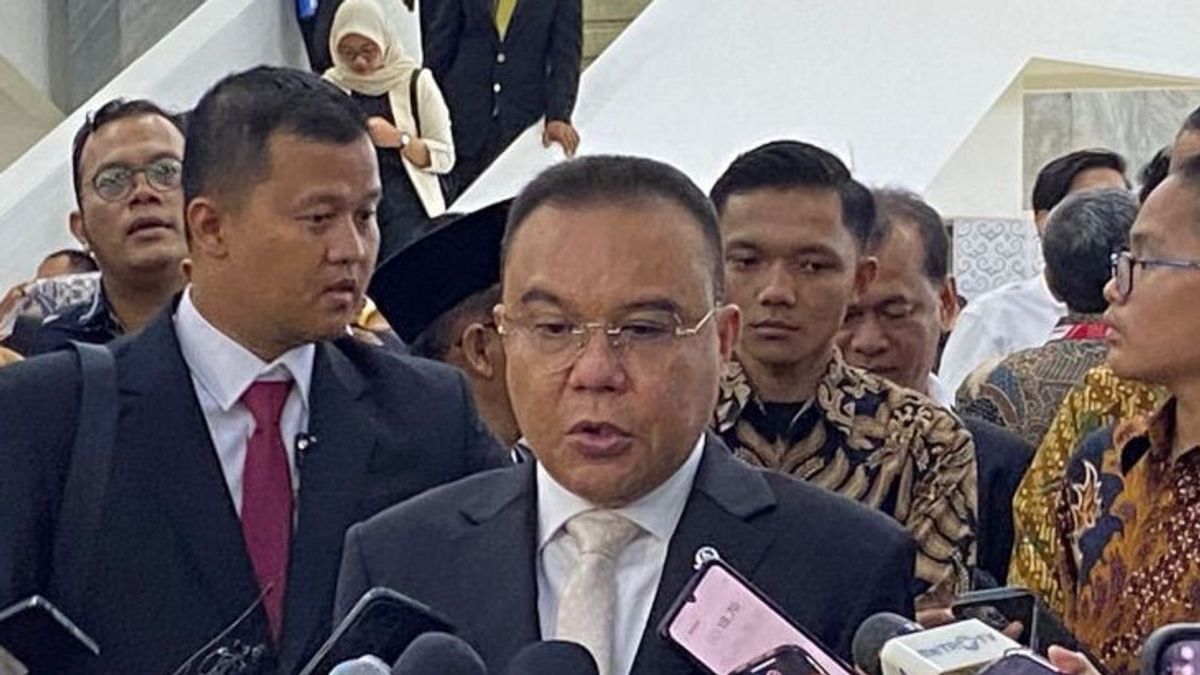JAKARTA - Wakil Ketua DPR RI Sufmi Dasco Ahmad menemui perwakilan Serikat buruh untuk menyikapi putusan Mahkamah Konstitusi (MK) ya g mengabulkan sebagian gugatan uji materi terhadap Undang-Undang Nomor 6 Tahun 2023 tentang Cipta Kerja yang diajukan Partai Buruh dkk.
Dasco menyatakan, DPR dan pemerintah akan mengkaji indeks upah layak bagi buruh. Seiring tidak berlakunya Peraturan Pemerintah Nomor 51 Tahun 2023 tentang Perubahan atas Peraturan Pemerintah Nomor 36 Tahun 201 tentang Pengupahan.
"Kami tadi sudah mengadakan pertemuan, ini Pak Said Iqbal sebagai yang mewakili salah satu elemen buruh. Tadi sudah menyampaikan beberapa hal dan tadi juga sudah bertemu dengan Menteri Tenaga Kerja. Yang intinya bahwa sesuai dengan keputusan MK, bahwa kami dari DPR menyatakan bahwa memang PP 51 itu sudah tidak berlaku," ujar Dasco di Kompleks Parlemen, Senayan, Jakarta, Rabu, 6 November.
"Dan lalu kemudian menyikapi keputusan MK mengenai upah dan lain-lain tadi sudah disepakati bahwa buruh, pemerintah, dan DPR akan mengkaji dan membahas dengan seksama bagaimana indeks upah buruh supaya tidak ada yang dirugikan baik dari pengusaha maupun buruh," sambungnya.
Karena PP/51 sudah tidak berlaku, lanjut Dasco, maka harus ada penyesuaian pengupahan dan lain-lain yang akan dibicarakan bersama-sama. Dasco optimis, penyesuaian ini akan berlaku sebelum dua tahun sebagaimana tenggat waktu yang diberikan.
"Ya, kita optimis bahwa ini akan dapat terealisasi dalam waktu yang tidak lama. Tetapi memang perlu waktu untuk membicarakan karena ini hal bukan hal yang mudah dan juga tidak harus terburu-buru," jelas Ketua Harian DPP Gerindra itu.
Diketahui, Mahkamah Konstitusi (MK) mengabulkan sebagian gugatan uji materi terhadap Undang-Undang Nomor 6 Tahun 2023 tentang Cipta Kerja yang diajukan Partai Buruh dkk.
Salah satu amar putusan MK tersebut menyangkut soal mekanisme Pemutusan Hubungan Kerja (PHK) yang diatur dalam Pasal 151 ayat (4) dalam Pasal 81 angka 40 Lampiran UU Ciptaker.
MK menyatakan frasa yang terkandung dalam pasal itu bertentangan dengan Undang-Undang Dasar 1945. Adapun frasa yang dianggap bertentangan oleh MK itu berbunyi 'pemutusan hubungan kerja dilakukan melalui tahap berikutnya sesuai dengan mekanisme penyelesaian hubungan industrial'.
"Menyatakan frasa 'pemutusan hubungan kerja dilakukan melalui tahap berikutnya sesuai dengan mekanisme penyelesaian perselisihan hubungan industrial' dalam Pasal 151 ayat (4) dalam Pasal 81 angka 40 Lampiran UU Ciptaker bertentangan dengan UUD 1945," seperti dikutip dari salinan putusan MK, dikutip Rabu, 6 November.
Adapun Pasal 151 ayat (4) UU Cipta Kerja ini mengatur tentang pekerja yang sudah diberitahu terkena PHK, namun menolak keputusan tersebut. Ketika perundingan bipartit antara perusahaan dan pekerja/serikat pekerja berakhir buntu, maka keputusan PHK harus dilakukan melalui penyelesaian Perselisihan Hubungan Industrial.
Dalam putusannya, MK mengubah bunyi pasal tersebut dengan memperjelas mekanisme yang harus ditempuh ketika perusahaan ingin memecat seseorang. MK menyatakan Pemutusan Hubungan Kerja itu hanya bisa dilakukan setelah lembaga penyelesaian perselisihan hubungan industrial memberikan keputusan yang mengikat.
SEE ALSO:
"...tidak memiliki kekuatan hukum mengikat sepanjang tidak dimaknai, 'Dalam hal perundingan bipartit sebagaimana dimaksud pada ayat (3) tidak mendapatkan kesepakatan maka Pemutusan Hubungan Kerja hanya dapat dilakukan setelah memperoleh penetapan dari lembaga penyelesaian perselisihan hubungan industrial yang putusannya telah berkekuatan hukum tetap," tulis MK.
JAKARTA - Deputy Speaker of the Indonesian House of Representatives, Sufmi Dasco Ahmad, met with representatives of labor unions to respond to the decision of the Constitutional Court (MK), so they granted part of the judicial review lawsuit against Law Number 6 of 2023 concerning Job Creation submitted by the Labor Party et al.
Dasco stated that the DPR and the government will review the wage index for workers. Along with the non-commissioned Government Regulation Number 51 of 2023 concerning Amendments to Government Regulation Number 36 of 201 concerning Wages.
"We have already held a meeting, Mr. Said Iqbal as the one representing one of the elements of the workers. We have conveyed several things earlier and we have also met with the Minister of Manpower. The point is that in accordance with the Constitutional Court's decision, we from the DPR state that PP 51 is no longer valid," said Dasco at the Parliament Complex, Senayan, Jakarta, Wednesday, November 6.
"And then in response to the Constitutional Court's decision regarding wages and others, it has been agreed that workers, the government, and the DPR will carefully review and discuss how the labor wage index will be harmed by neither employers nor laborers," he continued.
Because PP/51 is no longer valid, continued Dasco, there must be wage adjustments and others that will be discussed together. Dasco is optimistic that this adjustment will take effect before two years as the deadline given.
"Yes, we are optimistic that this will be realized in a short time. But it does take time to talk about it because this is not an easy thing and also does not have to rush," explained the daily chairman of the Gerindra DPP.
It is known that the Constitutional Court (MK) granted part of the judicial review lawsuit against Law Number 6 of 2023 concerning Job Creation submitted by the Labor Party et al.
One of the decisions of the Constitutional Court concerns the mechanism for Termination of Work Relations (PHK) as regulated in Article 151 paragraph (4) in Article 81 number 40 of the Attachment of the Copyright Law.
The Constitutional Court stated that the phrase contained in the article contradicts the 1945 Constitution. The phrase that is considered contrary to the Constitutional Court reads 'determination of employment is carried out through the next stage in accordance with the mechanism for resolving industrial relations'.
"Declaring the phrase 'determination of employment is carried out through the next stage in accordance with the mechanism for resolving industrial relations disputes' in Article 151 paragraph (4) in Article 81 number 40 Attachment to the Copyright Law contradicts the 1945 Constitution," as quoted from a copy of the Constitutional Court's decision, quoted Wednesday, November 6.
As for Article 151 paragraph (4) of the Job Creation Law, it regulates workers who have been told to be laid off, but rejects the decision. When the bipartite negotiations between companies and workers/labor unions end in a dead end, the layoff decision must be made through the completion of the Industrial Relations Dispute.
In its decision, the Constitutional Court changed the sound of the article by clarifying the mechanism that must be taken when the company wants to fire someone. The Constitutional Court stated that the termination of employment can only be done after the institution for resolving industrial relations disputes provides a binding decision.
SEE ALSO:
"... do not have binding legal force as long as it is not interpreted, 'In the case of bipartite negotiations as referred to in paragraph (3) do not get an agreement, termination of employment can only be done after obtaining a determination from the institution to resolve industrial relations disputes whose decisions have permanent legal force," wrote the Constitutional Court.
The English, Chinese, Japanese, Arabic, and French versions are automatically generated by the AI. So there may still be inaccuracies in translating, please always see Indonesian as our main language. (system supported by DigitalSiber.id)

















